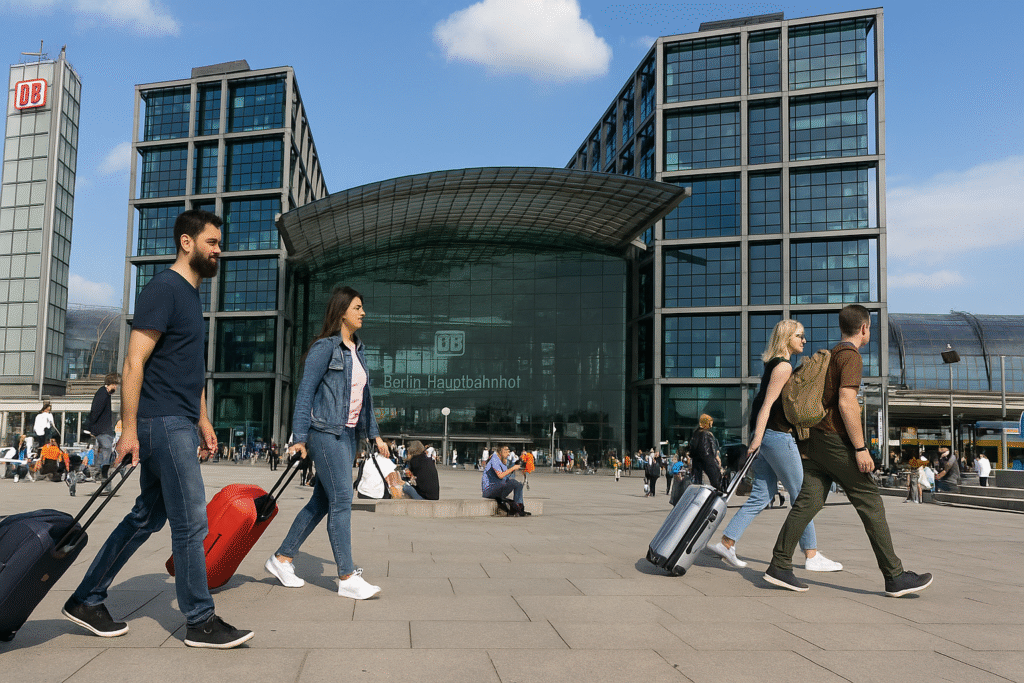
Overwhelmed After Landing in Germany? Here’s How to Take Control From Day One
Stepping into Germany for the first time is thrilling—but also chaotic. The unfamiliar language, chilly weather, and strict bureaucracy can feel like a tidal wave. But here’s the good news: with the right first steps, you can quickly gain control and build a solid foundation for your life in Germany. This guide breaks down the top 10 things you must do—clearly, confidently, and in the right order.
1. Why Is Getting a SIM Card Your First Smart Move?
A German SIM card is your lifeline.
Whether it’s booking appointments, receiving job offers, or accessing maps, everything starts with connectivity. Grab a prepaid SIM from Aldi, Lidl, MediaMarkt, or Saturn—they’re cheap, easy to activate, and available right in the airport or supermarket. Later, you can upgrade to a contract with better data and calling benefits.
2. How Can You Secure Long-Term Housing Without Losing Your Mind?
Without a registered address, you’re stuck.
Your accommodation unlocks everything else in Germany—from your residence permit to bank account. If you haven’t secured permanent housing before arrival, prioritize this immediately. Use platforms like WG-Gesucht or Immobilienscout24. Be open to sharing apartments (WGs) or living just outside major cities to increase your chances.
3. What Is Anmeldung and Why Must You Do It ASAP?
Anmeldung (city registration) is your golden ticket.
You legally have 14 days after moving into your residence to register at the local Bürgeramt. This simple yet powerful step gives you your official German address and Tax ID, which you’ll need for everything else. Tip: Book an appointment online early. Bring your passport, rental contract, and the essential Wohnungsgeberbestätigung from your landlord.
4. Why Do You Need a German Bank Account Right Away?
No account, no salary, no rent payment.
Open a bank account to start handling your finances. You can choose between traditional banks like Deutsche Bank or digital banks like N26, C24, or Revolut for faster setup. Submit your passport, Anmeldung certificate, and visa documents—all online in most cases.
5. What’s the Deal with German Health Insurance?
Health insurance isn’t optional—it’s the law.
Germany offers public (GKV) and private (PKV) options. Most students, jobseekers, and employees go for public insurance—it’s simple, affordable, and widely accepted. If you’re self-employed or earn above a threshold, private insurance may offer more benefits. Also consider liability insurance (Haftpflicht) for personal mishaps—it’s cheap but can save you thousands.
6. How Do You Convert Your Visa into a Residence Permit?
Stay legal and secure your future.
Most national visas are valid for 3–6 months. To stay longer, apply for your residence permit (Aufenthaltstitel) at your local Ausländerbehörde. Download the application online, book an appointment, and prepare documents: passport, visa, health insurance, Anmeldung, biometric photo, proof of funds, and a filled-out form. Processing takes 2–4 weeks depending on your city.
7. What’s the Smartest Way to Travel Around Germany?
Save money and stress by choosing the right transport.
Germany offers excellent public transport—trains, buses, and trams. Monthly or regional passes save you money. Buying a car is an option, but comes with high insurance, tax, and inspection costs. For the eco-conscious, bicycles are a great alternative—most cities have dedicated lanes and safe parking.
8. How Does the German Tax System Affect You?
Taxes are complex—but mastering them can earn you money.
Once registered, you receive a Tax ID. Your income is taxed based on your tax class (Steuerklasse). Every year, you’ll likely file a tax return (Steuererklärung), especially if you work. You could get a refund if you had job-related expenses. Use platforms like Taxfix or get help from a Steuerberater (tax advisor) to simplify the process.
9. Why Should You Start Learning German Right Away?
Speaking German transforms your everyday life.
While English works in big cities, learning German unlocks career growth, friendships, and independence. Start with free or low-cost courses at Volkshochschule (VHS) or use apps like Duolingo. But if possible, join an in-person course to learn faster and connect with others in the same boat.
10. How Can You Start Building a Real Life in Germany?
Integration isn’t instant—but it’s worth the effort.
Making friends and feeling at home takes time. Start by introducing yourself to neighbors, attending local events, joining a sports club, or participating in language exchanges. The more you engage, the more deeply you’ll connect with German society.
Final Thoughts: What’s Your Next Step?
Building a life in Germany can feel overwhelming—but it doesn’t have to be. Focus on one task at a time, stay patient, and know that every step brings you closer to stability and success. And remember, you’re not alone on this journey.
Need help navigating your move to Germany?
At ETAINFI, we offer free, real-world guidance for international students, jobseekers, and newcomers. Join our community today and start your journey with confidence.


